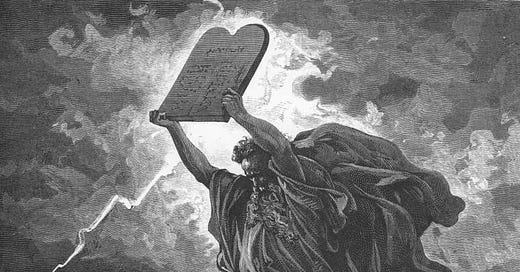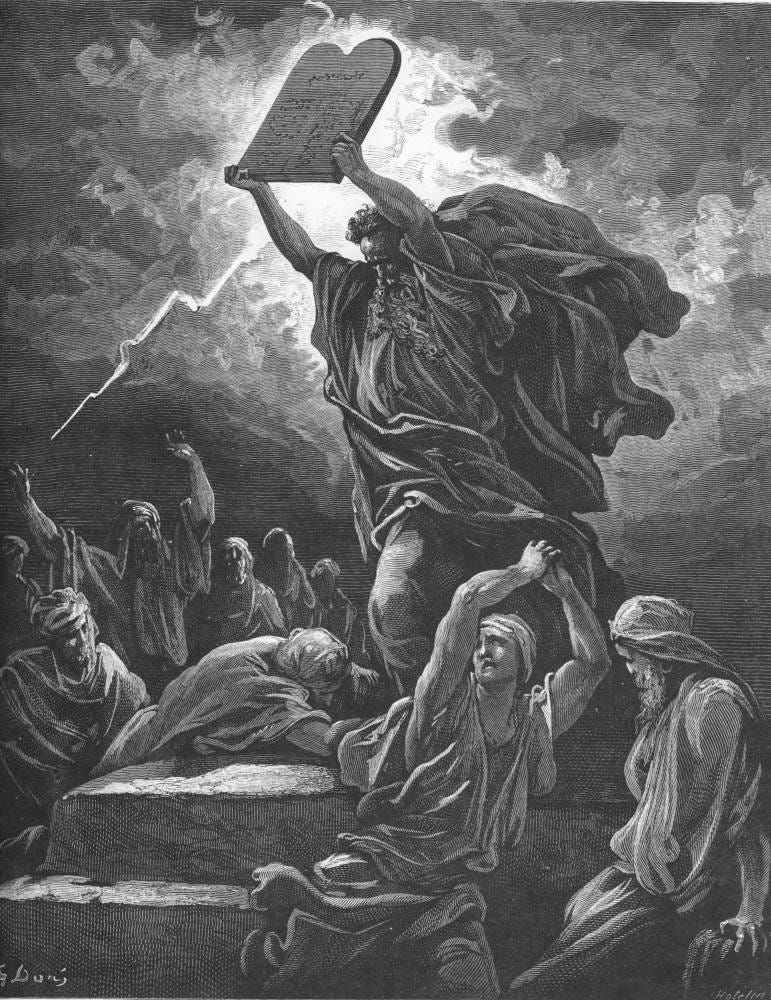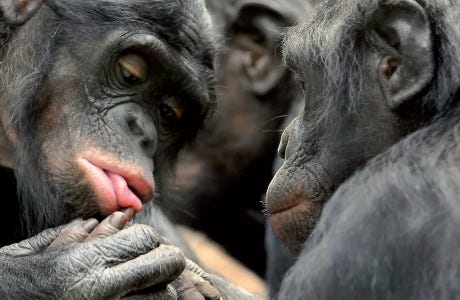The picture of our world offered to us by traditionally trusted sources has diverged from the reality perceived by skeptical scientists (that’s how I see myself and members of my community). The skeptics’ voices have been “canceled” by a powerful alliance of government, media, and tech giants. The censorship has been so effective that most people have been unaware that there is any dissent among experts.
But now, the lies are so big that the situation looks to me to be highly unstable; and yet it has lasted far longer and the divergence from reality has proceeded further than I thought possible.
“You think you are in the reality-based community...but when we act, we create our own reality. And while you’re studying that reality…we’ll act again, creating other new realities.”
— attributed to Karl Rove, 2004
Rove was speaking on behalf of the Republicans, mocking the Democrats. Twenty years later, the Democrats have learned the game, and they’re leading the psy-op.
Today’s NYTimes reports that a large swath of Democratic America has become distrustful of government and traditional news sources. They are looking to exit the Matrix. But another large swath is doubling down their reliance on sources they have always trusted. They are professionals and scholars, and their collective IQ supports their sneering attitude toward anyone who voted for Trump. They have no desire to be Red Pilled.
Reality is socially constructed. We can all recognize this as true in a sociological sense. Perhaps we go further with a PoMo framework, questioning the foundations of a science that tells us what the “real reality” is. At a yet deeper level, metaphysical idealism holds that the world we inhabit is created by our minds, collectively.
If all life is a dream, is it your dream or mine?
__And why should our two worlds agree?
An answer avails if we’re both The Divine,
__At our source, I am you and you’re me.
Though it seems that we’re separate (I trust you’ll concur
__It’s a stretch to conceive “one great soul”)
Still, we sense there are times when our boundaries blur
__Our designs coalesce as one whole.
What happens when our belief systems don’t agree? Whether in the political sense or in the ontological sense, our world is in the midst of a bifurcation, and I anticipate that this process will be consummated in 2025. Is it possible for the world to bifurcate in the sense of the Many Worlds Interpretation of quantum mechanics?
People who continue to believe conventional narratives may create a world in which it is actually true
that COVID was a bat virus gone rogue, and it was Science in the form of mRNA shots that saved tens of millions of lives
that autism rates haven’t changed, but new definitions result in 100 times as many autism diagnoses compared to 1985
that the war on terror is keeping us safe
that 15 young Islamists with boxcutters evaded America’s air defenses, brought down 3 skyscrapers, and made a hole in the Pentagon (right where the records were being kept concerning $2.3 trillion missing funds)
that the State should provide classroom litter boxes for all children who identify as cats
that pedophilia is a legitimate sexual preference, but adults need protection from microaggressions in the workplace
that Lee Harvey Oswald murdered JFK and Paul Wellstone’s plane went down in bad weather
that Israel is defending itself by bombing hospitals and maiming toddlers
that Putin’s invasion of Ukraine was unprovoked and motivated solely by a desire to rebuild the Soviet Empire
that the voice of anyone who doubts the above should be censored for the sake of democracy.
That will not be my world. It will be a world of stultifying conformity, where gender diversity is not just tolerated but enforced, while diversity of thought is compressed by censorship; where “preserving nature” means huge collective farms, mining of cobalt by slave children, and pipelines pumping CO2 into the bedrock. Where people will be coerced to take untested medical interventions based on dubious public health justifications. Where people will care about one another because those who don’t are shunned or jailed.
What’s the alternative? The other available path seems to be a path of rugged self-reliance, if not downright selfishness. Individual property rights trump all. Accumulation of private wealth is the principal marker of success. People have basement food caches for their families and shotguns to keep the neighbors out. There is a suspicion of anything communal that smells (in my nose) like McCarthyism from 1951; and yet, there is little awareness that the monopoly power of transnational corporations is a threat to freedom as serious as any government.
These untenable choices have inspired me to think about the kind of world that I want to live in, which is the launching point for this rambling end-of-year essay.
I’m picky about the world I want to live in.
I’ve given myself permission here to think outside the bounds of present political possibility.
I want to live in a world where people recognize that caring for others is their highest calling and the focus of a fulfilling life, where people share with one another because they feel nurtured and safe in their communities and they have plenty to share; they feel no apprehension for their own future, and it feels good to share. This is different from doing all these things because it is sanctioned by their religion or their state or their conscience.
I want to live in a world where I can travel and experience genuine diversity of cultures, people whose fundamental beliefs and ways of being are vastly different from my own, where people love one another because of cherished differences.
A world where centralized authority is absent and not missed, where I interact all day with eccentric human individuals, not AIs, not algorithms, not people in rigid roles, doing what they’re told.
A world that’s more organic, less hierarchical, where small is beautiful and there is an opportunity for every quirky personality to find a quirky but genuinely useful niche, a world where there are no bullshit jobs, and everyone feels connected to the people who benefit from their labor.
Of course, I want to live in a world where there is very little exploitation, little deception, vanishingly small incidence of violence. But I don’t accept that this means codified laws prohibiting these behaviors, laws enforced by a central authority in accordance with principles and procedures universally applied. Rather, when someone behaves in a way that is harmful to a community member or undermines the community’s spirit, Elders come together to support him, to help him to heal, to identify the early trauma that is almost always the root of such behavior, to talk in safety about the trauma and relive it with a support that he never knew the first time around, which is to heal.
I think that Hobbes’s myth about man in the state of nature — selfish, ruthless, and uncaring — has distorted our political culture for 400 years. I wonder if treating men distrustfully makes them untrustworthy. I wonder if criminal behavior would largely disappear in a community that makes a cherished and respected place for everyone, where everyone has an opportunity to contribute and is appreciated for their contribution, where riches are considered a quirk rather than an achievement.
We can imagine communities where maintaining safety and fairness is a distributed task, in which everyone has a stake and everyone plays a role. No need for police or courts, no violence or coercion. In certain indigenous cultures and religious communities, there is a consensus about acceptable behaviors, and norms are maintained by the gentle power of the community. It can work if the number of people is not too large.
Individually, I am asking each of us to give up a rule-based morality in favor of guidance from heart-based intuition. We are accustomed to comparing various moral systems from the Golden Rule to the Ten Commandments to Marcus Aurelius, St Augustine, and Kant’s Categorical Imperative. To give up all of these and trust our hearts, to trade a Confucian for a Daoist morality is a giant leap of faith. It may be related to what Nietzsche was asking of us, and what Jorjani is advocating today.
With discipline, you’ve stayed temptation’s pull
You’ve worked to do the right and noble thing
You realize one day, your life’s half full —
Uneasiness, but too remote to sting.
Good karma (you had reason to expect)
Would bring reward someday for all your pains.
But lately you’re beginning to suspect
There is no guarantee that justice reigns.Refusing others’ rules, shunning convention
You’ve freed yourself, only to rebuild walls.
Self-discipline had not been your intention,
Instinctual being from the distance calls…
Outside your window float the singing birds
When freedom comes at last, you have no words.
Animal instincts are remarkably sophisticated. They do not simply behave in the interests of their selfish genes, as Sociobiological theory would predict. The forest communities and resilient ecosystems we find in nature would not be possible without richly complex animal instincts guiding their behaviors.
But human societies include a range of relationships not found in nature. Consider marriage, employment, commercial transactions, international trade, public personas, rules of engagement in war…Are these situations so complex and so far removed from our evolutionary history that our animal instincts will not suffice for guidance? I suggest that it will be healthy for us to return to Dunbar-sized communities and simpler, local engagement. Multinational corporations are efficient providers and distributors of manufactured goods, but they are destructive of the deeper values of human engagement and well-being.
Modern life has provided more material comfort and security, but too many people are chronically angry, depressed, constantly controlling their own behavior to cover up a seething, inner turmoil. International capitalism is falling apart, not just because the Web of Debt has become unsustainable, but for betraying our deeper human needs.
Social systems built on small communities with implicit expectations and organic structure can be rewarding contexts for life and work, but they are vulnerable to invasion. One sociopathic personality can wreak havoc in an idyllic, trusting community. Peaceful nations are easily conquered by others that devote themselves to the science of war. That does not mean that the world is doomed to domination by the strongest and most violent. But it is a reminder of the thesis of Guns, Germs, and Steel. The kinds of communities that I describe will be non-violent, and they will be vulnerable to conquest by outsiders who have no qualms about violence. I recognize that this is a problem for which I can’t offer a solution, but I am not resigned to the state monopoly on violence as the inevitable consequence.
Sex and society
I want to live in a world where people are supported to express their sexuality in all the diverse ways that are facets of our humanity without feeling that they need surgery to be the human that they want to be.
Sexuality, I would conjecture, is the area of life where we have the most to learn. We have no idea what a free and healthy sexuality looks like because we have always lived with rigid norms, or reactions against those norms, or various strategies of secrecy and coercion by which people try to break through shame and embarrassment to meet some part of this powerful human need. Maybe we can return to study Wilhelm Reich, who theorized about an essential sexual energy that breathes life into the cosmos. For this idea, Reich was exiled and censored all across Europe and later in America.
Why sex? Because it defies logic and the calculus of self interest. Because it is our gateway to a world of mystical union beyond our concerns with self-preservation.
I recently submitted an academic article about the role of sex in evolution. A version of Darwin’s theory that emphasizes selfish competition to the exclusion of all else has been the majority paradigm for most of the last century. But sex does not fit well in this paradigm. Sharing genes with others is what sex is all about, and sharing is the opposite of selfishness. According to the majority paradigm, natural selection should favor individuals that clone themselves, transmitting 100% of their genes to every offspring. The thesis of my article is that sex radically changes the dynamics of evolution, so that cooperation is rewarded by natural selection in a sexual population. In almost all higher organisms, reproduction has been tied tightly to sex. The obvious purpose of this would be to assure that everyone must share genes. The end result is that evolution produces robust ecosystems instead of violent, chaotic communities of selfish individuals.
I suspect that a healthy relationship to sex could be important for stabilizing the cooperative, instinctual community that I’ve described, but I have no experience to support this intuition. So I turn to primate ecology; we are related as closely to the bonobo as to the chimpanzee, but in today’s human cultures, we are more likely to settle conflict with contests of power, like the chimps, rather than with soothing touch and sexual connection, like the bonobos. We can change this.
I want to live in a world where people love life and have no fear of death. That’s a subject for another day.








Wow, brilliant essay., so very well expressed. Thank you for this (and the others) that make me stop and think. Your vision of a better world sounds ideal, and I appreciate so much that you put it into words on this first day of a new year. Let's hope and pray for it to come to pass. Happy new year.
Similar views, we have, Josh:
"I am asking each of us to give up a rule-based morality in favor of guidance from heart-based intuition."